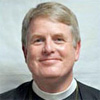“I got God on my side and I'm just trying to survive.
But what if what you do to survive kills the things you love?
Fear's a powerful thing. It can turn your heart black you can trust.
It'll take your God-filled soul and fill it with devils and dust.”
- from Bruce Springsteen’s “Devils & Dust”
Earlier this summer, the Governor of Texas held a rally at a Houston stadium. It was billed as a call to prayer for the renewal of our country. That’s something for which I hope we all pray. Yet, the event went beyond that. Rather than calling upon God’s providence and asking God’s mercy upon us all, people were called to act on their fears. Politicians (especially when they are running for public office) have learned to play the “fear card” quite well. It’s very simple: you gather people together, tell them how awful things are, then tell them who it is they should blame for their problems (not themselves or the politician, of course), and then whip them into a frenzy so they will do what you want.
“Fear is a powerful thing,” Springsteen wrote. Fear can lead us into all manner of behaviors, most of which, upon reflection and self-examination, don’t exemplify the highest virtues of the Christian faith. Such fear is a powerful weapon in the arsenal of political leaders. Fear, however legitimate (and many fears are), never serves us well as a primary response to whatever we face. Fear encourages reptilian reactions from our souls rather than the higher soul-functions of hospitality, compassion and generosity.
Fear can compel us to become, de facto, functional atheists. Functional atheism means we give assent to God’s grace-filled providence with our lips, but we actually live our lives as if we’re not part of a divinely coherent story that’s moving the world toward God’s plan of salvation. The gospel is clear about the world God created. St. John writes: “God did not send the Son into the world to condemn the world, but in order that the world might be saved through him.”
We need a renewed faith in the providence of God as an antidote to this functional atheism. Our faith unequivocally states what God is up to in this world. God is in the business of reconciling and restoring the world through the merits and mediation of Jesus Christ. The world isn’t a random, meaningless place. It’s God’s world full of love and meaning. That doesn’t mean the world is perfect. We know better. It’s full of sinners like you and me. But it does mean there’s a telos to the world rooted in and underwritten by God’s providence.
Those who want to manipulate us to live by fear seem to believe that God will be outflanked by what’s wrong with the world. So, this line of thinking goes, someone has to watch God’s back. That’s such a weak god. It’s the god of the functional atheist. It isn’t the God we meet in the Bible. The God and Father of our Lord Jesus Christ won’t be stumped by our sins or anything else, including our fears. It shouldn’t surprise us then that the most recurring words of Jesus in the gospel are: “Do not be afraid.”







